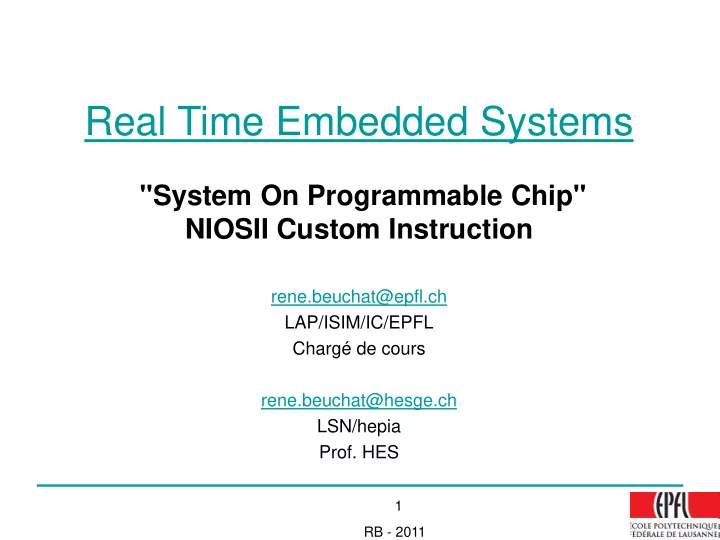

Real Time Embedded Systems "System On Programmable Chip" NIOSII Custom Instruction rene.beuchat@epfl.ch LAP/ISIM/IC/EPFL Chargé de cours rene.beuchat@hesge.ch LSN/hepia Prof. HES 1 RB - 2011
Contents • Introduction • Custom Instructions on NIOS II • Hardware • Software access from C References : • http://www.altera.com/literature/ug/ug_nios2_custom_instruction.pdf (NIOS II Custom Instruction, User Guide, Altera January 2011) 3 RB - 2011
Introduction A processor has an initial Instruction Set Architecture defined by the processor design architect. The instruction set is done to be the more efficient in general cases but not for special cases. Processors as DSP (Digital Signal Processor) have specialized instructions and not good for general purpose applications. With softcore processor, it’s possible to add instructions on the basic set available. 4 RB - 2011
Introduction If the result is correct and enough fast, it's nice. Some times it is necessary to accelerate the calculus time. Optimization is some time possible: • Rewriting part of the code more efficiently • Writing some part in assembly language • Using a better processor or system • Using specialize (co)processor • Using multiprocessors • Transfer part of the code in hardware in an accelerator i.e. in a FPGA 5 RB - 2011
Custom Instruction in FPGA • In parallel to the normal ALU, custom logic can be added 6 RB - 2011
Instruction implementation The instruction can be: • Combinational • Multi-cycle • Extended (until 256 instructions) • With internal Register File • With external acces 7 RB - 2011
Combinatorial Instruction • 2 * 32 bits data, 32 bits result • 1 clock cycle to resolve 8 RB - 2011
Multi-cycle Instruction • 2 * 32 bits data, 32 bits result • n clock cycle to resolve • start – done handshake 9 RB - 2011
Multi-cycle Instruction 10 RB - 2011
Extended instructions • More than 1 instruction in the bloc • Use a power of 2 instruction space (1, 2, 4, 8, …256) • n[ … ] signals added for instruction index 11 RB - 2011
Internal Register File • Internal registers until 32 • 2 sources registers (Ra, Rb) • 1 destination register (Rc) • Can be mixed with Dataa, Datab or Datac 32 bits data bus 12 RB - 2011
Internal Register File • Example of mixed data selection • dataa, datab and Rc 13 RB - 2011
External interface • External access allowed for multi-cycle access • Available with internal register file too 14 RB - 2011
Custom Instruction • Access done in C with macro defined • Use extension of gcc • Instruction: __builtin_custom_ o n i 1 i 2 (instr num, input 1, input 2) • Types of o i 1 i 2 : • i integer • f float • p void * 15 RB - 2011
Custom Instruction • Example: • void *__builtin_custom_ pnif (int n, int dataa, float datab); • pnif : • p output: void * • n separator • i input 1: integer • f input 2: float (32 bits) • All 3 parameters o i 1 i 2 are optional void __builtin_custom_nf (int n, float dataa); float __builtin_custom_fnpi (int n, void * dataa, int datab); 16 RB - 2011
Custom instruction example of use • 2 instructions defined : 17 RB - 2011
Assembly language definition • Custom opcode : 0x32 18 RB - 2011
Instruction assembly syntax • Assembly syntaxe: custom N, xC, xA, xB N: instruction number from system.h x: r NIOS II register through dataa, datab and result readra, rb, rc at 1 x: c Custom register file through a[], b[], c[] selection readra, rb, rc at 0 19 RB - 2011
Implementation • Implementation in HDL (VHDL or Verilog) through SOPC Builder 20 RB - 2011
Exercise • To test the capabilities of software vs hardware implementation, design a NIOSII system to realize the basic function of bits mirror and swap: • A 32 bits input a31..a0 • A 32 bits output result o31..o0 a31.. a24 o7 .. o0 byte position change a7 .. a0 o31 .. o24 a23 .. a8 o8 .. o23 bits order change ! 21 RB - 2011
Exercise • This function can be done for a single variable • This function can be done in a table of 1 to thousand of long data Do this function in C Implement it as a custom instruction Implement it in an accelerator module Implement it with the help of C2H • Measure the performance in all cases 22 RB - 2011
Recommend
More recommend